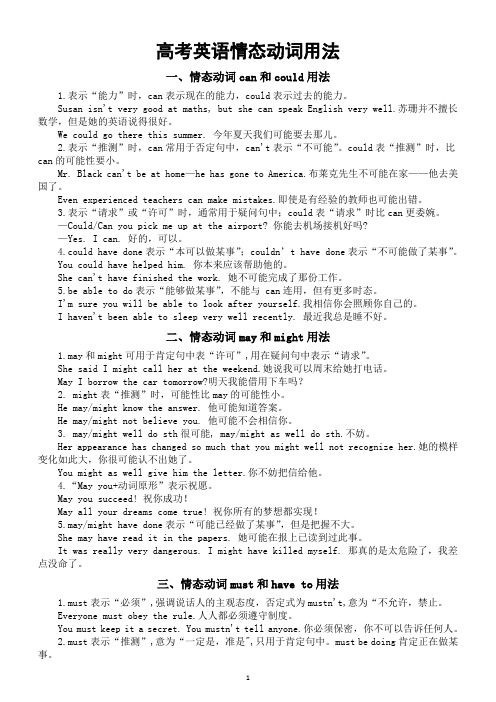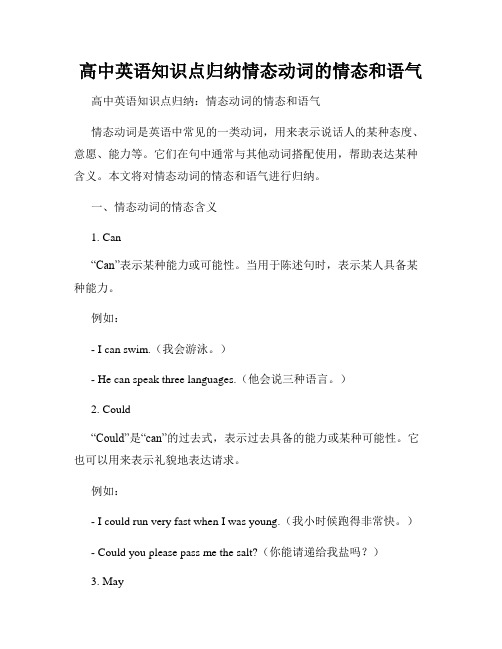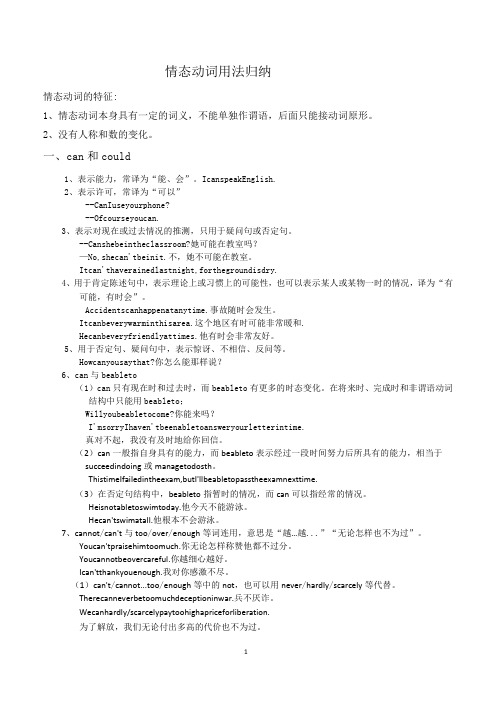高中英语情态动词[1]
高中英语情态动词ppt课件

Suqi1an Sarbrina
2
What’s the definition of modal verbs?
情态动词是一种本身有一定的词义,表 示说话人的情绪,态度或语气的动词,但 不能单独作谓语, 只能和其他动词原形 构成谓语。
3
一.情态动词的语法特征
1) 情态动词 不能单独做谓语,除 ought 和have 外,后面只能接不带to 的 不定式。
19
②. May 和Might
May I watch TV after supper?
禁止,阻止
Yes,_y_o_u_m__a_y__允__许__,_许__可__./ No, __Y__o_u_m__u_s_t_n_’t___________.
Might I use your telephone? Might比May的语气更委婉
12
Could you lend me your dictionary? Could I use your bike? Yes, you can. I’m afraid I couldn’t give you an answer today.
13
can/be able to区别:
can表示与生俱来的能力或一种客观可能,而 be able to更加强调通过后天的学习和努力获 得的能力,或者在某个客观的场合和背景下, 能做到的事情。
6
三.常见情态动词的基本用法
1. can could be able to 2. may might 3. will would 情态动词 4. shall 5. must have to 6. ought to should 7. need dare 8. 情态动词+have done 7
高中英语2025届高考情态动词用法归纳

高考英语情态动词用法一、情态动词can和could用法1.表示“能力”时,can表示现在的能力,could表示过去的能力。
Susan isn't very good at maths, but she can speak English very well.苏珊并不擅长数学,但是她的英语说得很好。
We could go there this summer. 今年夏天我们可能要去那儿。
2.表示“推测”时,can常用于否定句中,can't表示“不可能”。
could表“推测”时,比can的可能性要小。
Mr. Black can't be at home—he has gone to America.布莱克先生不可能在家——他去美国了。
Even experienced teachers can make mistakes.即使是有经验的教师也可能出错。
3.表示“请求”或“许可”时,通常用于疑问句中;could表“请求”时比can更委婉。
—Could/Can you pick me up at the airport? 你能去机场接机好吗?—Yes. I can. 好的,可以。
4.could have done表示“本可以做某事”;couldn’t have done表示“不可能做了某事”。
You could have helped him. 你本来应该帮助他的。
She can't have finished the work. 她不可能完成了那份工作。
5.be able to do表示“能够做某事”,不能与 can连用,但有更多时态。
I'm sure you will be able to look after yourself.我相信你会照顾你自己的。
I haven't been able to sleep very well recently. 最近我总是睡不好。
高中英语知识点归纳情态动词的情态和语气

高中英语知识点归纳情态动词的情态和语气高中英语知识点归纳:情态动词的情态和语气情态动词是英语中常见的一类动词,用来表示说话人的某种态度、意愿、能力等。
它们在句中通常与其他动词搭配使用,帮助表达某种含义。
本文将对情态动词的情态和语气进行归纳。
一、情态动词的情态含义1. Can“Can”表示某种能力或可能性。
当用于陈述句时,表示某人具备某种能力。
例如:- I can swim.(我会游泳。
)- He can speak three languages.(他会说三种语言。
)2. Could“Could”是“can”的过去式,表示过去具备的能力或某种可能性。
它也可以用来表示礼貌地表达请求。
例如:- I could run very fast when I was young.(我小时候跑得非常快。
)- Could you please pass me the salt?(你能请递给我盐吗?)3. May“May”用于表示允许、请求或推测。
例如:- You may go now.(你现在可以走了。
)- May I borrow your pen?(我可以借用你的钢笔吗?)- She may be at home.(她可能在家。
)4. Might“Might”是“may”的过去式,表示过去某种猜测、推测或可能性。
例如:- He might have forgotten the appointment.(他可能忘记了约定。
)- It might rain later.(说不定一会儿会下雨。
)5. Must“Must”表示一种推测或强烈的命令。
例如:- It must be cold outside.(外面肯定很冷。
)- You must finish your homework before going out.(出去之前你必须完成作业。
)6. Shall“Shall”常用于疑问句中,表示征求对方的意见或提出建议。
“高中英语课件-情态动词用法详解”

Might I borrow your pen?
M u st的用法
表示必要性
You must finish your homework before playing video games.
表示推测
He must be the new student in our class.
表示建议
You must try playing soccer. It's a lot of fun!
S h o u ld /O u g ht to 的用法
1
S h o u ld /O u g ht to 表示建议
You should/ought to study harder
S h o u ld /O u g ht to 表示期望
Would通常用于表示过去的习惯、愿望或礼貌的请求。
Need 的用法
Need可以表示必要性、需要或推测。
Used to 的用法
1 Used to 表示过去
的习惯
I used to go swimming every weekend.
2 Used to 表示过去
的状态
3 Used to 表示过去
不再存在的事物
表示愿望的情态动词
除了would之外,could和m ig h t 也可以用于表示愿望。
表示能力的情态动词
除了can之外,could, may和might也可以用于表示能力。
表示必要性的情态动词
除了must之外,should/ ought to和need也可以用于表示必要性。
情态动词的否定形式
3 动词原形搭配
情态动词通常与动词原形搭配使用。
高中英语情态动词课件精品

B. could可以代替can表示请求、“允许
”。可表示委婉客气的提出问题或陈述
看法
Could you lend me your dictionary? Could I use your bike? Yes, you can. I’m afraid I couldn’t give you an answer today.
意愿“要;愿”
Would 与 Used to do 区别 ——— “过去常常”
Would
------过去习惯的动作(现在有可能还有此习惯)
Used to do
--------过去习惯的动作及状态(现在已经没有此习惯)
e.g. He would get up at 8 a.m. (现在有可能还在坚持此习惯) e.g. He used to get up at 8 a.m. (现在已经不再坚持此习惯)
动作
e.g. There used to be an old building
here when I was young.
状态
shall和should:
1. shall用于构成将来时是助动词。 shall用于征求对方的意见,表示 “决心” 是情态动词。 eg: Perhaps I shall pay a visit to England this winter. 可能今年冬天我会去英国观光。 (构成一般将来时, 助动词)
3)表示请求或允许(和may意思相近)常见于 口语。 Can (May) I come in ? 我能进来吗? Can I smoke here ? 我可以在这里抽烟吗?
2) could的主要用法是: A. could 是can的过去式, 表示与过去 有关的能力和推测:
高中英语情态动词用法

情态动词用法归纳情态动词的特征:1、情态动词本身具有一定的词义,不能单独作谓语,后面只能接动词原形。
2、没有人称和数的变化。
一、can和could1、表示能力,常译为“能、会”。
IcanspeakEnglish.2、表示许可,常译为“可以”--CanIuseyourphone?--Ofcourseyoucan.3、表示对现在或过去情况的推测,只用于疑问句或否定句。
--Canshebeintheclassroom?她可能在教室吗?—No,shecan'tbeinit.不,她不可能在教室。
Itcan'thaverainedlastnight,forthegroundisdry.4、用于肯定陈述句中,表示理论上或习惯上的可能性,也可以表示某人或某物一时的情况,译为“有可能,有时会”。
Accidentscanhappenatanytime.事故随时会发生。
Itcanbeverywarminthisarea.这个地区有时可能非常暖和.Hecanbeveryfriendlyattimes.他有时会非常友好。
5、用于否定句、疑问句中,表示惊讶、不相信、反问等。
Howcanyousaythat?你怎么能那样说?6、can与beableto(1)can只有现在时和过去时,而beableto有更多的时态变化。
在将来时、完成时和非谓语动词结构中只能用beableto;Willyoubeabletocome?你能来吗?I'msorryIhaven'tbeenabletoansweryourletterintime.真对不起,我没有及时地给你回信。
(2)can一般指自身具有的能力,而beableto表示经过一段时间努力后所具有的能力,相当于succeedindoing或managetodosth。
ThistimeIfailedintheexam,butI'llbeabletopasstheexamnexttime.(3)在否定句结构中,beableto指暂时的情况,而can可以指经常的情况。
高中英语知识点归纳情态动词的用法与义项
高中英语知识点归纳情态动词的用法与义项情态动词是英语中一个重要的语法现象,是一种特殊的动词形式,用来表示说话人的态度、意愿、可能性、能力、推断等。
情态动词一般不能单独使用,而是与其他动词连用,构成动词词组来表示各种意义。
下面是对高中英语知识点归纳情态动词的用法与义项的总结。
一、情态动词的意义划分:1. 可能性(Possibility)情态动词:may, might, could, can用法:- may, might, could用于表示事情有可能发生或存在;- can主要用于表示某人具备某种能力。
示例:- It may rain tomorrow. (明天可能会下雨)- He might be at home. (他可能在家)- The key could be in the drawer. (钥匙可能在抽屉里)- I can speak Spanish. (我会说西班牙语)2. 动作愿望(Desire)情态动词:would like, want, wish用法:- would like用于表示客气地提出请求或愿望;- want用于表示强烈的需求或欲望;- wish用于表示遗憾或对现在情况的不满或希望。
示例:- I would like to have a cup of coffee. (我想来一杯咖啡)- She wants to go shopping. (她想去购物)- I wish I had more free time. (我希望我有更多的空闲时间) 3. 推测与推断(Speculation)情态动词:must, may, might用法:- must用于表示说话人根据某种依据做出肯定的推测; - may, might用于表示可能性的推测。
示例:- It must be raining outside. (外面肯定在下雨)- He may/might be busy right now. (他可能正忙)4. 动作能力(Ability)情态动词:can, could用法:- can表示某人具备某种能力;- could表示过去的能力或给予请求、许可的非正式方式。
高中英语:情态动词与虚拟语气语法知识点
高中英语:情态动词与虚拟语气语法知识点高中英语:情态动词与虚拟语气语法知识点情态动词的基本用法情态动词具有一定的词义,没有人称和数的变化,必须和其他动词一起构成谓语,用来表示愿望、态度或猜测等。
1.表示能力(1)表示如今的能力:can am\is\are able to(2)表示未来的能力:will be able to(3)表示过去的能力:could表示过去的能力,别表示是否做;was\were able to表示过去有能力做,同时成功做了,相当于:managed to do sth\succeeded in doing sth;could have done表示过去本来可以做但未做。
I can't promise anything, but I'll do what I can.我别能许诺啥,但我会竭力而为。
(表示如今的能力)The fire spread through the hotel very quickly but everyone was able to get out. 虽然这场大火迅速蔓延到了那个宾馆,然而每个人都逃了出去。
(表示过去有能力做同时成功地做了)I could have worked out the problem, but I was too nervous.我本来能够解出这道题,但我太紧张了。
(表示本来有能力做但未做)2.表示猜测(也许性)也许性可分为客观的也许性和具体情况实际发生的也许性两种。
(1)客观的也许性并别表示具体某事是否会发生,而用来讲明人或事物的特征。
情态动词can 可用于确信句中表示客观的(或理论的)也许性,而表示具体情况实际发生的也许性时, can 普通别用于确信句。
Accidents can happen on such rainy days.在如此的多雨天气里也许会发生事故。
(表示客观的也许性)We may go to the cinema tonight, but we are not sure yet.今晚我们也许去看电影,但还没确定。
高考英语情态动词和虚拟语气
告,决心”等 诺)
意思。
③If you don't get out, I shall knock you
down. (警告)
19
正面解读
4.shall/will/would
情 态 意义 例句 动词
备注
will/w 表 示 ①I will do everything for you. ② ould 意愿 None is so blind as those who
② —Need you go at go at once. —Do you need to go at once ? —Yes , I must. once?—Yes,I do. /No, I needn't.
②need作情态动词常用于否定、疑问或条 件句中。
dare ① He daren't cross the dare和need一样,既可以作情态动词,也
列
9
情态动词+have done表示对过去情况的推 测
(一)should /ought to have done本来应做而未做,表达遗憾感 情色彩
例1:I told Sally how to get there, but perhaps I ____for her.(NMET94) A. had to write it out B. must have written it out C. should have written it out D. ought to write it out 析:选C。分析语境可知,口头上告知Sally如何去
例1:--- Where is my pen?
---DI _____it.(NMET88)
A. might lose
高中英语-情态动词 课件(共34张PPT)艺体班
• Must的奇葩用法 "偏偏,非得要” • You must play the piano at such a late time? • Why must school begin so early?
四、 shall, should
1) shall 用于第一\三人称疑问句,征求对方的意见。(will用于第 二人称疑问句,征求对方的意见。)
need *否定句及疑问句中;
(sb.) need to do
dare
dare to do
3.常以needn’t 的形式出现;
和daren’t(sth.)
need
to
be
4.dare有其过去时dared.
done
(sth.) need doing
• need 的被动含义:need,want, require, worth (adj.)后面接doing 也可表示被动
• (1)表示许可;
• (2)用于祈使句,表示祝愿,翻译为“祝……”
•
May you succeed!
• (3)把握不太大的推测(只能用在肯定句,不用于疑问句)
•
might不是过去式,它所表示的可能性比may小。
•
1.He may /might be very busy now.
• 固定结构: • 1.may well 有充足的的理由可以-• You may well be proud of him. • 2.may/might as well 还是…为好 • There’s nothing to do, so I may/might/ as well go to bed. • 既然没什么事可做,我还是去睡觉为好. • 3.might as well have done 还不如--(还可用于指过去的
- 1、下载文档前请自行甄别文档内容的完整性,平台不提供额外的编辑、内容补充、找答案等附加服务。
- 2、"仅部分预览"的文档,不可在线预览部分如存在完整性等问题,可反馈申请退款(可完整预览的文档不适用该条件!)。
- 3、如文档侵犯您的权益,请联系客服反馈,我们会尽快为您处理(人工客服工作时间:9:00-18:30)。
高中英语情态动词 1 情态动词 情态动词表示说话人对动作或状态的各种观点和态度,如需要、猜测、意愿或怀疑等。情态动词有词义,但不完全,是所谓的“辅助性”动词,在句中不能单独充当谓语。 一、 情态动词的特征和形式 A. 情态动词的各种形式见下表: 情态动词 否定式 简略否定式
may might can could must have to ought to will would shall should need dare used to
may not might not cannot can not could not must not do not have to ought not to will not would not shall not should not need not dare not used not to did not use to mayn't(老式英语,现在不常见) mightn't can't couldn't mustn't don't have to oughtn't to (否定句中to可省略) won't wouldn't shan't (只用于英国英语) shouldn't needn't daren't usedn't to didn't use to B.情态动词除ought to, used to等外,后面只接不带to的不定式。 1.情态动词+do You shouldn't be so careless. 你不该这样粗心大意。 Jessica told him yesterday she might not go on the trip. 杰西卡昨天告诉他,她可能不去旅行了。 Difficulties can and must be overcome. 困难能够而且必须克服。 2.情态动词+be doing She must be listening to pop music. 她肯定在听流行音乐。 You should be reviewing your lessons. 你应该在复习功课。 My mother maymight be cooking now. 我妈妈可能正在做饭。 3.情态动词+have done They might have visited the Great Wall. 他们可能参观过长城了。 He must have got up very early to catch the train. 他一定起得很早去赶火车了。 You ought to have come earlier. 你本该早一点儿来。 4.情态动词+be done This word can also be used as a verb. 这个词也可以用作动词。 Something must be done to stop pollution. 必须采取措施来制止污染。 The work ought to have been finished long ago. 这工作早就该完成了。
C. 情态动词第三人称单数一般现在时没有词形变化。 You ought to wear a raincoat. 你应该穿件雨衣。 She ought to wear a raincoat. 她应该穿件雨衣。 Plants must have oxygen in order to live. 为了存活植物必须有氧气。 A plant must have oxygen in order to live. 为了存活植物必须有氧气。 高中英语情态动词 2
D. 情态动词的时态并不是区分时间的主要标志。在一些场合中,情态动词的现在式和过去式都可以表示现在时间、过去时间或将来时间。 I'm afraid it might rain tonight. 我看今晚可能要下雨。 Could I borrow your thermos? 我可以借用你的暖水瓶吗? It's a nice day today. We could go for a walk. 今天天气不错,我们可以出去散散步。 E. 情态动词是互相排斥的,一般不允许两个意义相近的情态动词连用。 【误】Soldiers must have to obey orders. 【正】Soldiers have to obey orders. 军人必须服从命令。 【正】Soldiers must obey orders. 军人必须服从命令。 【误】Can I be able to borrow two books at a time? 【正】Can I borrow two books at a time? 我能一次借两本书吗? 【正】Will I be able to borrow two books at a time ? 我能一次借两本书吗? 二、 情态动词的意义和用法 A. may和might 1.表示请求、许可,常译为“可以”。 在口语中可用can, could代替may,但在正式场合用may。表示允许时,也可用might代替,might不表示过去时,而是表示口气比较婉转。 You may take this seat if you like. 如果你喜欢可以坐这个位置。 May/Can /Could/ Might I have a talk with you ? 我可以和你谈谈吗? --- May/Might I come into the room to see my mother? 我可以进房间看我母亲吗? --- No, you mustn't. She needs to have a good rest. 不,你不能进。她需要好好休息。 提示: May I ... 问句常见的肯定回答和否定回答。 肯定回答Yes, please. Certainly. Yes, of course. Sure. Go ahead, please. 否定回答 No, you can't. (最常见)No, you mustn't. (具有强烈禁止的意思) Please don't. You'd better not. I don't think you can. I'm sorry it's not allowed. 2.表示推测,可译为“可能,也许”。 Your math teacher maymight be in his office. 你们的数学老师可能在办公室里。(一般情况下,might表示的可能性很小) The light isn't on. It maymight be broken. 那盏灯没有亮,它可能坏了。 There may might be some ink left in the bottle. 瓶子里也许还剩点儿墨水。 注意: 用may表示推测一般不用于疑问句,在疑问句中通常用can来代替。 Can he be at home? 他可能在家吗? --- Can it be true? 这可能是真的吗? --- It may be, or may not be. 可能是,也可能不是。 3.用在目的状语从句中,构成谓语。 He wants to take a taxi so that he may get there in time. 他想坐出租车,这样他就能及时到达那里。 I arrived at the airport earlier in order that I might meet him. 我早早地就到了机场为了能接到他。 4. 有时可以用于祈使句表示祝愿。 May you succeed. 祝你成功 May you be happy. 祝你快乐。 May that day come soon. 希望这一天早日到来。 B. can和could 1. 表示能力,可译为“能,会”。 I can swim. 我会游泳。 高中英语情态动词 3
Emily can dance well and her mother could dance well when she was young. 艾米丽舞跳得很好,她妈妈年轻时舞跳得也很好。 The cinema can seat 1,000 people. 这电影院能容纳1,000人。 I could not read such an easy book when I was 7 years old. 我七岁时连如此简单的书我也看不懂。 2. 表示允许、许可,常用在口语中。could比can语气上要客气。 --- Could I use your dictionary? 我可以用一下你的字典吗? ---Yes, go ahead. 可以,用吧。(或Yes, you can. 但不能说Yes, you could.) Could Can you tell me how to get to the zoo? 劳驾,你能告诉我怎么去动物园吗? He asked me whether he could take the book out of the reading room. 他问我可不可以把书带出阅览室。 3.表示推测,可用于肯定句(can罕见)、否定句和疑问句,但更常见于疑问句或否定句。在此种用法中can和could没有时态的区别,只是表示可能性的大小,can表示推测的可能性比could大。 Can he be ill at home? 他会是生病在家吗? Can the story be true? 这个故事会是真的吗? He cannot be at home. 他不可能在家。 You mustn't smoke while you are walking around in the woods. You could start a fire. 在林子里走时一定不要吸烟,那样可能会引起火灾。 4.表示惊异、怀疑、不相信等态度,主要用于否定句和疑问句中。 How can you be so careless? 你怎么这么粗心? Where can could they have gone? 他们会去了哪里? He can'tcouldn't be over sixty. 他不可能超过60岁。 5.Could可以用在虚拟条件句中。 If I could fly, I should be very happy. 如果我能飞, 我会很高兴。 If you had followed my advice, you could have finished it.如果你当时听我的,你早就做完了。If you had tried harder, you could have passed your exam. 如果你再努力些,你就能通过考试了。 6.can与be able to的区别 ①can表示“能力”时,和be able to相当,许多场合都可以互相替换。但当叙述过去经过一番努力才能完成的事情或前面有特殊说明,表示你有能力时,只能用be able to。 【正】Can you speak any foreign languages? 你会说外语吗? 【正】Are you able to speak any foreign languages? 你会说外语吗? 【误】The fire spread the building quickly but everybody could escape. 【正】The fire spread the building quickly but everybody was able to escape. 大火迅速蔓延到整幢大楼,但大家都逃了出来。 【正】The fire spread the building quickly but everybody managed to escape. 大火迅速蔓延到整幢大楼,但大家都想法逃了出来。 ②be able to 比can有更多形式。 No one could answer the question.没人能回答这个问题。(这里could可用was able to 代替) When he grows up, he will be able to support his family. 他长大后就能养家了。 Frank is ill. He hasn't been able to go to school for one week. 弗兰克病了,已经一周没去上学了。 I'm sorry for not being able to help you in time. 对不起,不能及时帮你的忙。 ③could经常和动词see, hear, smell, taste, feel, remember, understand等连用。 When we went into the house, we could smell something burning. 当我们走进屋子时,我们闻到什么东西烧焦了。(不用was able to)
